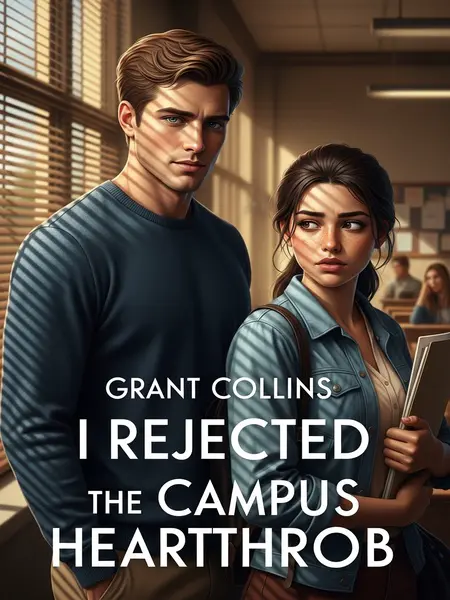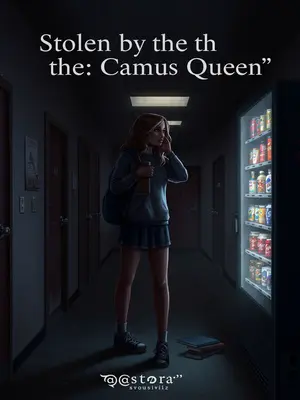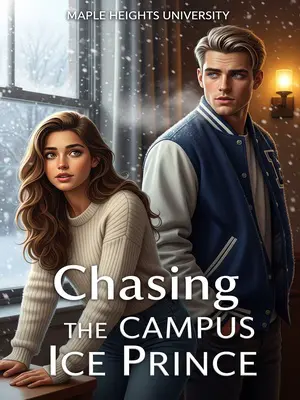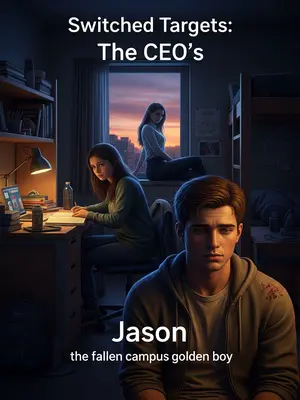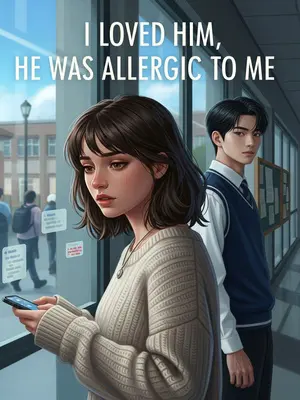Chapter 2: Gossip, Boundaries, and Blurred Lines
But when the Memorial Day break ended and we returned to campus, I realized it wasn’t really over at all.
The gossip didn’t stay online. It spilled over into real life, as it always does in a small college town. Word travels faster than Wi-Fi in places like this. There’s just no escaping the grapevine.
It had just moved offline.
Everywhere I went—cafeteria, library, even the gym—someone was whispering about Grant.
Almost every acquaintance I ran into gossiped, “Did you hear the campus heartthrob got rejected?”
I heard it in the bathroom, in line for coffee, even during a pop quiz. It was like the whole campus had decided this was the story of the semester.
And the rumors only got more ridiculous.
Each retelling got wilder. By the end of the week, the story had grown legs and was running laps around the truth.
By the end, I was hearing versions like, “Grant Collins chased a girl for eight years, got rejected, then tried to jump off a building. When they took him away in the ambulance, he was barely breathing.”
I had to bite my tongue to keep from laughing—or crying—at how fast things spiraled.
Even scarier, Grant was actually affected by it all.
His texts became shorter, more anxious. I could tell he was struggling, even if he tried to play it cool.
He messaged me for help: “Are you free? I want to do another support session.”
I hesitated, thumb hovering over the screen. This was getting complicated.
But now that he had feelings for me, it wasn’t appropriate—professionally or personally—for me to keep counseling him. I remembered a heated class discussion about ethics, and the words kept echoing in my head. Still, my heart wavered.
The ethics were clear. But my heart wasn’t so sure.
I was about to turn him down when he added:
“I feel awful.”
“They’re all talking about me.”
“Can you help me?”
His vulnerability was raw. I could almost hear the sadness in his voice.
I typed out a rejection over and over, but I just couldn’t bring myself to say no. So I agreed.
I told myself I’d make it the last session. Just one more. For his sake.
We met in a small private room at the campus coffee shop—comfortable, private, and safe.
The hum of espresso machines and indie music made the place feel a little more normal. I chose a table in the corner, away from prying eyes.
When I arrived, Grant was already there.
He looked smaller than usual, hunched over, his hair falling into his eyes. He barely glanced up when I walked in.
He sat with his back to me at a small round table, head down. The way he hunched over made his white shirt stretch across his toned back. I caught myself staring—ugh, get a grip, Emma—then quickly looked away, cheeks burning.
Even when he was upset, he looked annoyingly good. It was almost unfair.
I had to admit—even in this gloomy mood, Grant was still ridiculously good-looking.
I shook off the thought and slid into the seat across from him, trying to focus on the job.
He looked up, his eyes lighting up when he saw me.
There was a flicker of hope in his gaze that made my heart ache a little.
I pressed my lips together and asked, “What happened? Want to talk about it?”
I tried to keep my voice gentle, professional, but it wavered a bit. I hoped he didn’t notice.
He nodded, sneaking a shy glance at me before starting: “Lately, I’ve fallen for a girl. I really, really like her. I finally worked up the courage to confess, but she turned me down.”
He said it so earnestly that I almost forgot he was talking about me.
He seemed to be treating me as just his peer support, pouring his heart out like a love-struck client.
If he liked someone else, this would be no problem.
But the person he liked was me!
I tried to hide my awkwardness, but my cheeks felt hot. This was getting harder by the second.
A strange, hard-to-pin-down feeling kept bubbling up inside me.
It was like a mix of guilt, pride, and something softer I didn’t want to name yet.
He continued, “Actually, the girl I like didn’t reject me outright. She said we could talk about it, that I still had a chance. I’m not naïve enough to think that means she likes me, but at least she didn’t say no, right?”
I bit my lip, remembering my own uncertainty. Maybe I hadn’t been as clear as I thought.
“But everyone’s saying I’m just love-brained, that I’m delusional, that I’m just a backup plan and she’ll dump me as soon as she finds someone better.”
His voice wavered. I could see how much the rumors hurt him.
“I feel so miserable…”
He slumped lower in his chair. I wanted to reach across the table and squeeze his hand.
He poured his heart out, but my mind kept wandering.
I kept thinking about how surreal this all was. If only the forum trolls could see us now.
There it was again, that weird feeling.
It was getting harder to ignore. I forced myself to focus.
I forced myself to focus and replied, “If what they’re saying isn’t true, why let it bother you?”
It was textbook advice, but I meant it. The truth is, people will talk no matter what.
He sighed. “But I think maybe they’re right.”
His voice was so small, I barely heard him over the coffee shop music.
“Maybe she really doesn’t like me and just didn’t want to reject me to my face.” His eyes fell, voice full of defeat.
I wanted to protest, but the words stuck in my throat.
Suddenly, I didn’t know what to say.
I stared at my coffee, wishing for some magic answer. But there wasn’t one.
He peeked up at me.
His eyes searched mine, desperate for reassurance. I felt my resolve slipping.
That look in his eyes—it was like he’d switched from client to suitor, silently begging me for an answer.
I swallowed hard, trying not to give myself away.
But what could I say?
Like, or don’t like—neither word belonged in a conversation between peer support and client.
The lines were blurring, and I didn’t know how to fix it.
I couldn’t help but think: once emotions get involved, counseling really does get messy.
I remembered what my professor said: "Emotions are the wild card." No kidding.
Our talk lasted nearly an hour.
We circled around the same topics, neither of us really saying what we wanted to say. By the end, we were both drained.
He didn’t seem any better, and I was exhausted.
I felt like I’d run a marathon in place. Nothing had changed, but everything felt heavier.
Before we parted, Grant straightened his collar a little, looking shy as he said, “See you Friday.”
He tried to sound casual, but I could hear the hope in his voice.
I thought to myself, probably not.
I’d already made up my mind. This couldn’t keep going.
Because I’d already submitted a request to change my support assignment.
It was the right thing to do, even if it stung.
The program required a certain number of sessions each semester. Grant and I had agreed to meet every two weeks, which meant another session this Friday.
I counted the sessions on my calendar, feeling a pang of regret. We were supposed to have more time.
But under these circumstances, I was clearly no longer suitable as his peer support.
Boundaries mattered. I owed it to both of us.
It’s not uncommon for clients to develop feelings for their counselors—it’s called transference in psychology. We’d covered it in class, and I always thought it sounded like something out of a soap opera. Now, here I was, living it.
Because counselors are so accepting and supportive, clients can develop strong attachments.
It’s natural, even expected. But it’s not real love—not the kind that lasts.
Sometimes, people mistake that for love.
I’d seen it happen to others. Now it was my turn.
But it isn’t.
Grant didn’t really like me.
I tried to remind myself of that, even as my heart argued otherwise.
Maybe he liked the freedom to say whatever he wanted, maybe he liked the comfort and safety of our sessions, maybe he just liked having someone who accepted him unconditionally… but it couldn’t really be me he liked.
I wrote it out in my journal, hoping if I saw it in black and white, I’d believe it.
If he did, then the support had failed.
My request to switch clients was quickly approved.
I got the email during class. Relief, then a stab of guilt.
That Friday, I welcomed a new visitor: a petite girl barely five feet tall.
She looked nervous but determined, clutching her backpack like a lifeline.
She struggled with self-esteem because of her height and couldn’t let it go.
We talked about shoes, confidence, and the pressure to measure up—literally and figuratively.
After nearly an hour, she left with a smile, and I felt a real sense of accomplishment.
It was the kind of satisfaction I’d hoped for when I chose this major.
I stayed to finish my notes before leaving.
I wrote up her session, feeling lighter than I had in weeks. My phone buzzed, but I ignored it until I was done.
My phone was on silent, so I didn’t see the missed calls and unread messages until I went to pay for dinner.
I glanced at the screen, surprised by the sheer number of notifications. All from Grant.
My stomach dropped. I knew I owed him an explanation.
It was wrong of me to change assignments without telling him, so I called him back. He answered, but didn’t say anything.
The silence was heavy. I could hear his breathing, quick and shallow.
He sounded hurt, but also… expectant, maybe?
“It’s me,” I started.
I tried to sound calm, but my voice shook a little.
He lowered his voice. “Why?”
It was barely more than a whisper, but I could hear the pain behind it.
Then, his voice thick with emotion: “Did I do something wrong?”
The guilt hit me all over again. I wanted to fix it, but I didn’t know how.
I felt a pang of guilt. “Grant, can we talk?”
I waited, holding my breath.
“Yeah.”
It was soft, but it was enough.
“I’m at the third dining hall, by the rice bowls. I’ll wait for you.”
I picked the spot because it was public, but not too crowded. Plus, he loved their tomato and egg over rice.
He arrived quickly.
He looked like he’d run the whole way—hair tousled, cheeks flushed. There was an energy about him that made my heart skip.
His hair was windblown, T-shirt, sweatpants, sneakers—the usually polished campus heartthrob looking a bit wild for once.
It was oddly endearing, seeing him like this. More real.
I pushed a bowl of tomato and egg over rice toward him, speaking gently: “Eat something, it’s your favorite.”
He looked at me, but didn’t touch the food. “I want to hear your reason.”
His eyes were locked on mine, searching for the truth.
So I explained transference, why he might feel the way he did, and why I had to change clients. To be honest, it felt weird talking about psychology like this with Grant sitting right in front of me. It was one thing to discuss boundaries in class, another to tell Grant face-to-face why I couldn’t be his support anymore.
I laid it all out, trying to be honest but gentle. I wanted him to understand, not feel rejected.
I finished, “Even if you don’t really like me, just having those feelings means I can’t be your peer support anymore.”
He was quiet for a moment, then his eyes lit up. “If you’re not my support anymore, then there’s no rule against dating me, right?”
I blinked, caught off guard by how quickly he turned the situation around.
“…How did you get there?”
He pressed on, “So you didn’t reject me because you don’t like me, but because you couldn’t, as my support?”
He was relentless, but I couldn’t help but admire his persistence.
“I never—”
He cut me off, still caught up in his excitement, muttering, “But I didn’t fall for you because of support—I liked you long before—”
He stopped abruptly.
I caught the slip, my curiosity spiking.
Did I just hear that right? “Huh?”
He froze, eyes wide. It was almost cute.
It was like he’d accidentally blurted out the truth and then froze up.
I wasn’t about to let him off the hook. “You just said you liked me for a long time. Is that true?”
He was silent for a while, then finally nodded.
He looked like he was bracing for impact, but he didn’t look away.
Grant wanted to open up, but was still working up the nerve.
I could see him gathering his thoughts, searching for the right words.
He finally picked up his spoon, stirred the rice and sauce together, took a bite, and said slowly, “Do you remember Casey?”
I nodded, picturing that quiet little girl.
“She’s my sister.”
That caught me off guard. Suddenly, things started to click.
He explained, “I use my mom’s last name.”
He shrugged, as if it was no big deal, but I could tell it mattered to him.
“My sister has autism. She doesn’t speak, but she’s amazing at drawing. I used to look at her drawings to see what she was thinking, what she did each day—and that’s where I saw you.”
His voice softened as he spoke about her. I could tell how much she meant to him.
It was during a two-month internship in my sophomore year. The school sent students to different community sites, and I was assigned to a center for children with autism.
I remembered those days—long hours, challenging kids, but moments of real connection.
“In her drawings, you tied her shoes, changed her dirty clothes, helped her when boys bullied her… I could tell she really liked you.”
He smiled, lost in the memory. I felt a strange warmth in my chest.
“She drew you every day. In her black-and-white sketches, you were the only one in color.”
The image made me smile. I had no idea I’d left such an impression.
“We were all worried about her adjusting to school, but then she met you.”
He looked at me, gratitude shining in his eyes.
“It was obvious she was doing great, and my whole family was grateful.”
I couldn’t help but say, “It was just my job.”
I meant it, but his smile told me he didn’t believe it.
He smiled softly. “Exactly. You did so much, and still thought it was just your job—that’s what makes it special.”
His words lingered in the air, making me feel both proud and embarrassed.
I was at a loss for words after his praise.
I fiddled with my fork, not sure how to respond. Compliments always made me awkward.
He went on, “One day, I saw you in her drawing, wearing a red vest and waving goodbye with the school logo on it. That’s when I realized you went to my school.”
I tried to remember that day, but it was all a blur.
“Then I found out the fairy in her drawings was you, Emma.”
My heart skipped a beat at the sound of my name on his lips.
I thought I understood. “So you liked me because your sister did?”
But Grant shook his head immediately. “It wasn’t because of my sister.”
He was adamant, eyes locked on mine.
He said, “I admit she made me notice you, but that’s not why I like you.”
His gaze was clear and intense. “I like you just for who you are.”
I felt my cheeks heat up under his stare. I looked away, suddenly shy.
His look was so sincere I couldn’t meet his eyes. I quickly took a bite of rice.
The taste barely registered. I was too busy trying not to smile.
He watched me, voice low and mesmerizing: “It’s not that I liked the support because of you—it’s that I like you, so I liked the support.”
He said it so simply, but it hit me hard. I didn’t know what to say.
“If it wasn’t you, nothing anyone said would help.”
My heart pounded wildly.
The room felt suddenly too warm. I gripped my water glass, trying to steady myself.
At that moment, I had to admit—Grant’s charm was off the charts.
Even when he was vulnerable, he was magnetic. I wondered if he even realized it.
Even though I didn’t have feelings for him, hearing him speak so softly and honestly made me blush.
I ducked my head, hoping he didn’t notice.
Ignoring my embarrassment, he said bluntly, “Now that we’re not support and client, and it’s not about my sister—it’s just me liking you… can I ask you out?”
He looked at me with that open, hopeful expression. It was impossible to look away.
I pressed my lips together. “If I say no, are you going to go buy cigarettes again?”
He smiled, “I’d be sad if you said no. But I’d be really happy if you said yes.”
He always managed to say the perfect thing, making me doubt whether he really had social anxiety.
I raised an eyebrow, but he just grinned wider.
He pressed, “So, can I?”
His eyes sparkled with mischief and hope. I felt myself caving.
Under his eager gaze, I wanted to hide.
But I couldn’t.
Wherever I tried to hide, his eyes would follow.
Finally, ears burning, I threw out, “Chase me if you want.”
I tried to sound nonchalant, but my voice came out a little shaky.
He broke into a huge grin. “That’s as good as saying yes.”
His happiness was infectious. I found myself smiling back, despite myself.
Grant’s pursuit wasn’t just talk.
He was subtle but persistent, always finding ways to be near me without being overbearing.
He’d quietly walk me back to my dorm after night classes, or show up to sit in on my psych lectures.
He’d sit in the back, pretending to take notes, but I could feel his eyes on me the whole time.
He didn’t do much—just seemed to want to be near me.
It was sweet, but also a little nerve-wracking. I’d never been on anyone’s radar like this before.
But someone like him drew attention everywhere, and after a while, there were even forum polls about who Grant was pursuing.
My roommate sent me screenshots, cackling. My name was right there, circled in red.
My name was right there on the list.
I wanted to crawl under my bed and hide until graduation.
I was honestly scared of the attention and gently asked him to tone it down.
He listened and stopped being so obvious.
He nodded, looking a little sheepish. I appreciated that he respected my boundaries.
But the sneaking around made it even more exciting—I almost felt like we were having a secret affair.
It was like living in a rom-com, only with more anxiety and less background music.
Like that time—
He was on stage hosting the campus singing competition, and I was in the audience.
He kept glancing at me.
Every time our eyes met, my heart did a little flip. I tried to act casual, but I knew I was blushing.
Those looks sent my heart racing.
I even remembered what he’d said before going on stage: “I only feel calm when I see you.”
He’d whispered it backstage, voice barely above a whisper. It stuck with me all night.
I hadn’t planned to go, but because of that, I showed up.
I told myself it was just to support a friend, but I knew better.
The competition wrapped without a hitch.
The crowd went wild, and Grant took his final bow. I felt a surge of pride—and something else I couldn’t name.
Right after, I got a message from Grant.
He asked me to wait for him under the biggest maple tree behind the music hall—he had something to tell me.
I hesitated, then shrugged. What was one more secret meeting?
I had nothing else to do, so I went. Soon, Grant showed up in a suit.
He looked good—too good. I tried not to stare.
He jogged over, stopped in front of me, looking a bit shy. “How did I do?”
His cheeks were a little pink, and he wouldn’t quite meet my eyes.
Honestly, I was blown away.
On stage, he was confident and charismatic; off stage, he was pure, eager, and sincere—the contrast was dizzying.
I felt like I was seeing two sides of the same coin.
He waited for my answer. I sincerely praised him, “You were amazing! I couldn’t tell you were nervous at all!”
He smiled. “That’s because you were there.”
He really was a smooth talker. I teased, “Is all this sweet talk standard for people with social anxiety?”
He replied, “For us, the sweet talk is only for someone we like.”
He winked, and I rolled my eyes, but I couldn’t hide my smile.
“….”
I changed the subject. “So, what did you want?”
He fished around in his pocket and pulled out a stack of pink stationery. I blinked, curiosity spiking—was this really happening?
I was shocked—was he giving me a love letter?
He laughed. “It’s an invitation. My sister drew it.”
Relief flooded me. I could handle an invitation. A love letter would’ve sent me running.
I opened it—her comic made it clear: his sister’s birthday was next week, and I was invited.
The drawings were adorable—stick figures, balloons, and a big cake with my name on it.
Grant shyly scratched his neck. “I promised her I’d get you to come.”
He looked so earnest I couldn’t say no.
What could I say? I didn’t want to let her down, so I agreed.
